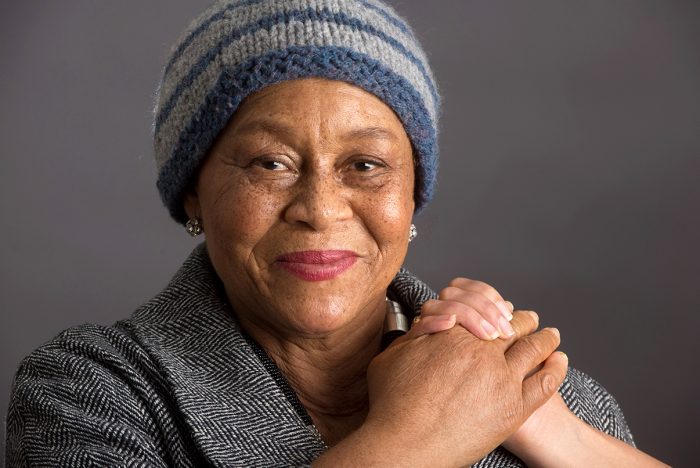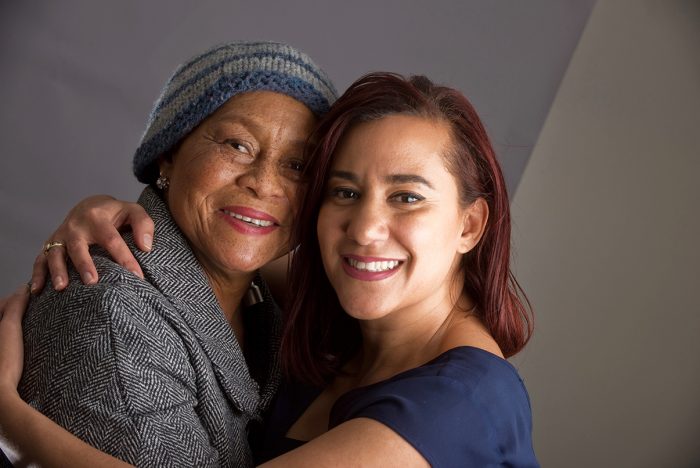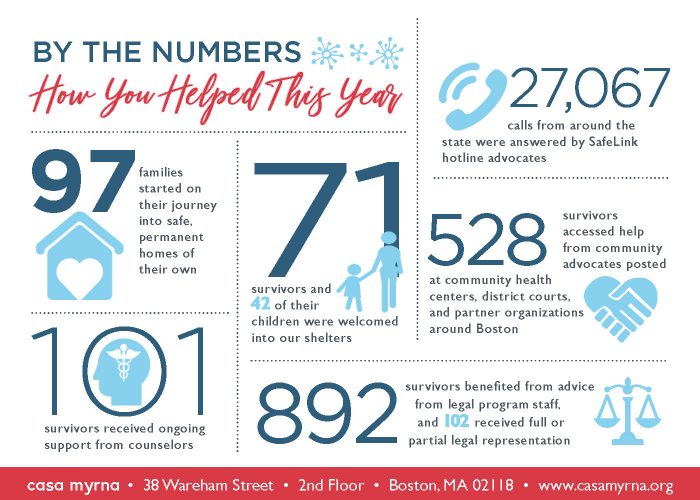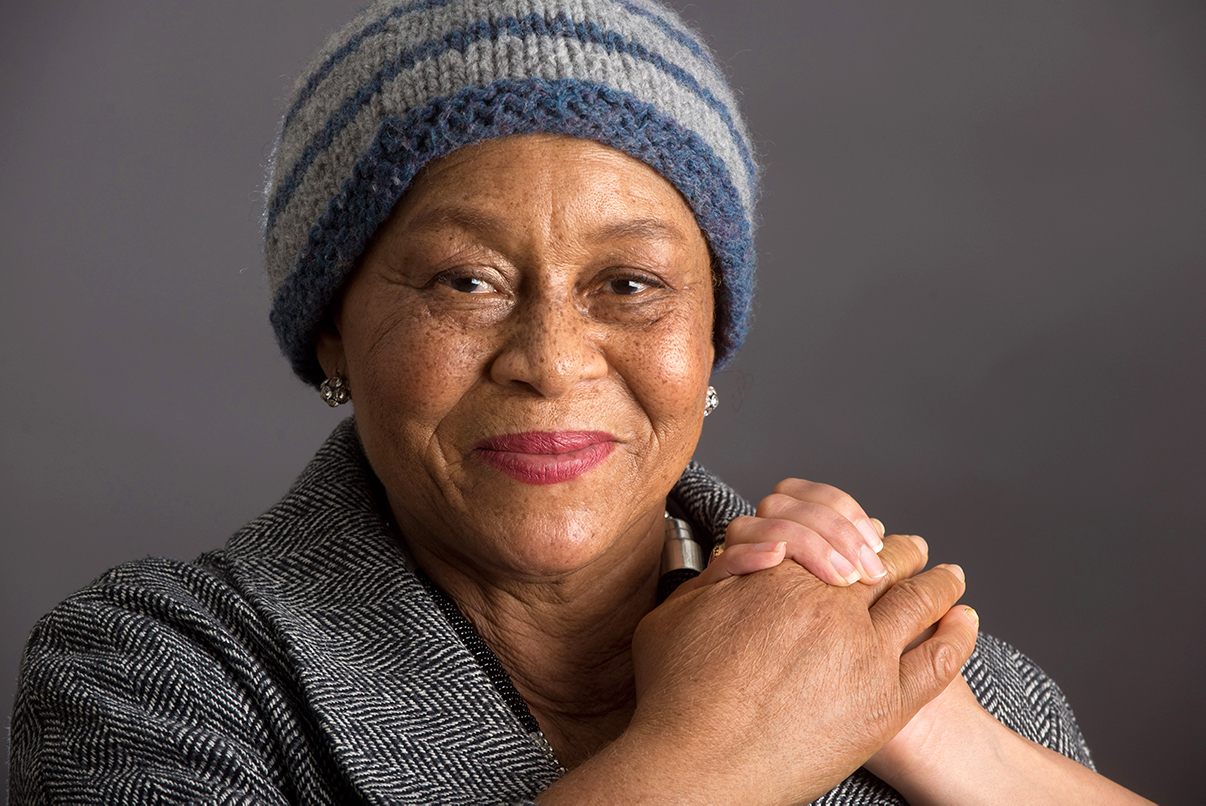Survivor Story
Josephine
Josephine, 59, is originally from Nigeria. She holds a degree in counseling and is the mother of one grown daughter and three triplet grandchildren, age four. She is active in her church community and volunteers at local programs that assist homeless people. She hopes to find job at a social services agency where she can help fellow refugees and survivors of abuse like her. Josephine currently lives at one of Casa Myrna’s residential shelters, where she is a beloved honorary grandmother to all the children. She radiates a kindness, gentleness, and openness that warms everyone who is lucky enough to meet her and see the smile she’s almost always wearing.
Show Love & Be Bold: Josephine’s Story
When the time is right, be strong and bold. People will help you, just like they helped me.
I’ve always felt called to help others. At university in Nigeria, I studied counseling so I could be there for people who were in crisis or struggling with life’s everyday problems. Later, no matter how busy I was as a working professional and single mom, I found the time to lend a hand to anyone going through hard times, whether friends, family members, members of my church, or strangers. It was important for me to share my love, live my faith, and show a good example to my daughter. But then I became the one who needed help, and I was afraid that no one would help me.
Here’s how it happened.
Six years ago, I was preparing to start a new chapter in my life. I had met a wonderful man, a lawyer, who had immigrated to the U.S.. and was back in our homeland for a long visit. It was unexpected–I was 53 years old and wasn’t looking for a man!–but we fell in love and got married. It was hard to imagine leaving my family across the ocean, but my daughter was grown-up and independent now, and I knew my extended family would be there for her too.
I was so excited to start my life with my husband and to see what it was like to live in a foreign country. My new husband and I decided that I would move to his home in Boston in May to begin settling in and improving my English while he wrapped up his visit to Nigeria.
An Unexpected Tragedy
Only two months later, I got a terrible phone call from back home: my husband had died. We had only been married for nine months. He would never join me in the US. I was shocked, grief-stricken, and alone.
When my husband died, I lost my home and my legal immigration status. I couldn’t work, and though my family back home sent me the money they could spare, I soon found that it wasn’t enough to get by on in an expensive American city like Boston. Meanwhile, I was terrified of being sent to prison for being undocumented, but I was also afraid to return home, where violence against people of my faith had started getting worse and worse. Unfortunately, it wouldn’t be the last time I would feel trapped.
Not fluent enough in English to figure out how to get help from anyone else, I turned to the only people I knew in Boston: my husband’s family. When my mother-in-law and step-sons agreed to take me in, I was so grateful. My mother-in-law was kind and welcoming, and I felt like here was somewhere I could start healing from my grief and figure out what to do next.
But I did not feel safe for long. My step-sons’ live-in girlfriends found out about my being undocumented, and they decided to take advantage. They began threatening to report me unless I worked from morning to night cooking and cleaning and waiting on them like their slave. They would scream at me and intimidate me and accuse me of having affairs with my step-sons, and my money and things would often mysteriously disappear from the basement where I lived. I was desperate to get out, but I didn’t know where to go.
From One Trap into Another
I tried to spend as much time out of the house as I could by while running errands for my husband’s family. I had gotten to know a friendly local man and his mother at a nearby flea market, and when I opened up to them about my situation, he offered to marry me and let me move in.
It’s not something I ever would have imagined agreeing to even six months before. But now I felt like it was the best choice among only bad ones. I told myself that the man and his mother seemed kind, and that at least I would be safe.
But instead, my situation got even worse. Not long after I moved in, the abuse began. My new husband beat me frequently, threatened and verbally abused me, and locked me inside the house so I couldn’t leave without his permission. He forced me to open a shared bank account with him so that he could take the little bit of money my family sent me from Nigeria each month. He and his mother often gambled at casinos and quickly burned through my savings.
The only person who saw what was going on and tried to help was my elderly neighbor. He tried to protect me, and in response my husband intensified his abuse. He began beating me more badly and more often.
I know now that it’s typical for abusers to escalate when they see signs that their victims might be able to leave, and that’s what happened to me. He threw out my things and regularly threatened to kill me if I didn’t obey him. He claimed that because I was undocumented, I had no rights, and that no one would care if he killed me and no one would help me get away.
I believed him, and so I tried to endure. But I was too afraid of him to sleep much on most nights, and my health deteriorated.

Finding Help and Escaping Abuse
After an especially terrible beating that lasted for hours, I was seriously hurt. My neighbor tried to comfort me and took photos of my injuries. I was in so much pain and knew needed to go to the hospital, but I also knew that my abuser would never let me out.
At 5 AM the next morning, I decided to leave. I gathered my few belongings and sneaked out of the house to the bus stop. My abuser followed me and screamed at me, demanding I return home. The people at the bus stop were strangers to me, but they stood up up to my abuser and protected me! They kept him from hurting me, and another stranger offered to drive me straight to the hospital.
As I was being treated at the hospital, a social worker came to visit me and told me that she would call the police to arrest my abuser. I begged her not to. I was convinced that, like my abuser he told me, if the police came, I would go to prison for being undocumented and he would go free. The social worker realized the lies I’d been told and eventually convinced me that American law protected me, not my abuser.
My abuser was wrong. I did have rights. People did care, and they did help me.
My abuser was arrested and charged for his violence against me, and I received a restraining order. Later on, the photos my neighbor had taken of my injuries helped ensure that my abuser was convicted. When I think of how they caught him, it makes me raise my arms and cheer!
Coming to Casa Myrna and Becoming Free
After my abuser was arrested and I healed physically, I wanted to feel safe, but in reality I didn’t know where to go next. I was afraid that I would go from living in fear with my abuser to living in fear on the streets. Thankfully, one day I went to an event for survivors of domestic violence about our legal rights where I met an attorney who referred me to Katherine, the head of Casa Myrna’s legal department. Katherine helped find me a room at one of Casa Myrna’s residential shelters for survivors of domestic violence and their children.
When I walked in to Casa Myrna, my world turned around. At first I couldn’t believe it: I had my own bed, a cabinet with my own food. That day I truly realized that I was free. It felt like all my problems just melted away at that moment, and I couldn’t stop crying. I feel now that without Casa Myrna, I wouldn’t have survived.
Living at Casa Myrna has also given me the greatest joy of all: I can give back by helping others. I am the oldest survivor at the shelter, so it’s my prerogative to show love to the other women and their kids (and even spoil them a little). I am so proud to be able to be there for the other survivors and their wonderful children with hugs, advice, and support when they need me.
Despite my own experiences, every survivor at Casa Myrna has stories that make me cry to hear what they’ve lived through. And now every one of us is safe, free, and healing.

Where I Am Now
Over the last four years as I’ve lived on and off at Casa Myrna, so much has changed for me. Shortly after I moved into the shelter, I was looking forward to becoming a grandmother and to seeing daughter for the first time in years. She was pregnant and flying from Nigeria to see me when she went in labor early. The plane made an emergency landing in Florida so she could deliver safely. Thanks to Casa Myrna, I was able to buy plane tickets to fly there to spend time with my daughter and meet my newborn triplet grandbabies!
I hope to return to Nigeria one day so I can be closer to my family, but right now it isn’t safe for me to go home due to violence against people of my faith. I’ve worked with Casa Myrna lawyers to become a documented refugee, so now I can stay in Boston legally. I am so grateful to this country for helping me become safe, both by offering me asylum and catching my abuser.
After what I survived over the last several years thanks to the help of strangers, I feel a deep need to give back. I especially hope to find a job where I can help refugees and survivors like me. I think sharing my own story will help them feel less alone and begin to hope for the future.
With the help of Casa Myrna and FINEX House, I recently obtained my work permit and social security number so that I can get a full-time job! I have wonderful friends through my church and my time volunteering with organizations that help the homeless, and I have already started working part-time helping families I’ve met with cooking, cleaning, and taking care of children and elderly people. I’m also currently working with Jessica, a housing specialist from Casa Myrna, to find my very own apartment. This month, I’m excited to be finishing up a computer skills educational program that will help me find my dream job in social services, perhaps at a shelter or a group home.
This is what I say to others experiencing abuse, especially young people: My biggest regret is not asking for help sooner. No situation is the end of the road. Don’t sacrifice yourself to any relationship. You don’t have to rely on your abuser or anyone else. Show love and keep smiling when you can, and be patient. When the time is right, be strong and bold. People will help you, just like they helped me.
Looking Forward to the Future
These days, my dream is to return to Casa Myrna, all dressed up in a beautiful outfit and with a job and a home of my own, to say “look at me now!” I want every survivor see that they can get the help they need, and I want everyone who was there for me to see what they helped me accomplish.
I have so many people to thank: my family; my neighbor; the strangers at the bus stop; the doctors, social workers, and nurses; the police and DA’s office; my immigration lawyers; my friends from church and volunteering; my teachers at the educational program; and all of the staff, survivors and children at Casa Myrna. When I think of all those people, when I look at the photos of my grandchildren that I keep in my purse, or when I look forward to seeing the children at the shelter tearing open presents on Christmas morning, or when I imagine my future helping other survivors and refugees, I am so happy.
If you’re reading this, you’re probably also someone who wants to help survivors–who maybe even helped me without knowing it by supporting Casa Myrna over the last four years.
To you, I say “Look at me now! Look at what you did for me! Look at what you can do for survivors!” And most importantly, I say, “THANK YOU!”
– Josephine, November 2018
You Can Help Survivors Like Josephine
To support the Casa Myrna programs that assisted Josephine, please consider making a donation here. Your gift ensures that survivors and their children can escape abuse and recover from its aftermath in home-like shelter programs and begin rebuilding lives full of hope, joy, and safety. Thank you for joining us in the movement to end abuse in all its forms.



